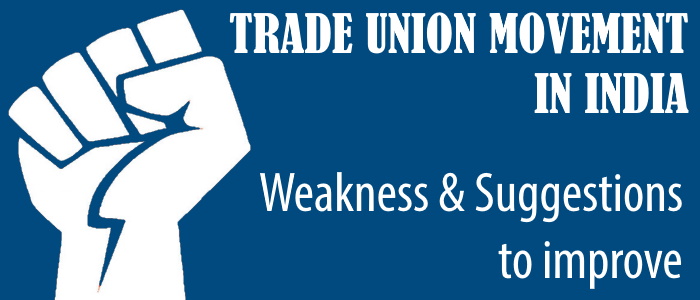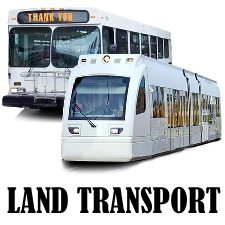Weaknesses of Trade Union Movement in India and Suggestion to Strengthen
Table of Contents
Weaknesses of Trade Union Movement in India
In spite of its legal and social importance, trade unionism in India is suffering from a number of inherent defects. The very history of the movement is a depressive narrative, full of conflicts and confusion meaningless controversies and vilification. The following are the weaknesses and problems of trade unionism in India.

1. A Handmaid of Politics
Trade unions in our country are only handmaids of political parties and the unions do not have independence of policies nor could they make separate pronouncement on the public policy and the unions are tied up with political parties functioning as mere adjuncts of the parties. Far from being equals, joined together for promoting mutual strength and interest, the trade unions are subservient to political parties, thus losing their separate entity. Just like England, trade unions in India are allied with political parties, but unlike in England, political divisions in India have affected the growth of trade unions.
2. Less of Labour interest and More of Political Interest
Before independence the trade union movement was a wing of national independence movement and after independence it has become a projection of Indian politics. The unity of purpose has disappeared after independence and organizations never tried to live up to the ideas and objectives, though every union had high sounding aims and objectives. The Indian labour being illiterate and ignorant, could not organize themselves well to have a movement without the help of ‘outsiders’.
Thus, from the very beginning, Indian trade union movement has been dominated by outsiders and is deeply involved in politics. Outsiders are not workers. They never lived the life of a worker. Their approach was purely intellectual and legal and trade unionism was a tool for them or for their party. Hence, in all cases, the issues were not important from the point of view of the workers and in the name of workers, the decisions were taken by politicians. Unions are exploited for political purposes and their legitimate functions are completely ignored. A strange feature in Indian trade union movement is that it discourages a worker who has no interest in any political party but who has interest only in work and trade unionism.
3. Lack of Leadership
Even after 70 years of trade unionism, the Indian workers are not in a position to lead the movement and the ordinary workers have not been able to assume leadership. This is mainly because of the hold of the ‘outsiders’ over the unions. Indian political parties and their representatives in the trade union movement are not prepared to leave it alone. This type of domination of political parties in leadership leads to inter-union rivalry and formation of a large number of small unions.
Leadership by ‘outsiders’ is necessary to a certain extent at the initial stages but it should not go to the extent of exploiting the labourers by irresponsible leaders for political gain. This type of outside political pseudo-leadership weakens the unions and, consequently, they have to rely heavily on the government sponsored industrial relations machinery in preference to methods of collective bargaining and mutual assurance.
Dr. Henry Schloss of Washington University who toured India in 1959-1960, categorically stated that
“A genuine labour movement seems to be present. This is reflected in the fact that the union leadership is not, by and large identified with the workers but often consists of a professional leadership financed by political parties. “
In India, the consensus appears to be that the relationship between political parties and labour movement is an inverted and vicious relationship — a state of affairs in which political parties use trade unions as instruments of party politics, instead of trade unions choosing political parties.
4. Rickety Structure
According to V.V. Giri, the main defects of the trade unions in India are their rickety nature having poor membership and, consequently, poor financial resources and lack of whole time paid officers to look after the work of the unions.
5. Multiple Unions and Rivalries
Multiplicity of trade unions, inter-union rivalries as well as political rivalries, naturally, lead to disunity in the ranks of workers which proves harmful for the healthy growth of trade unionism.
6. Absence of Positivism
Most of the trade unions in India exhibit a deplorable lack of positivism in their approach to problems. Unions concentrate their attention and work on the organisation of strikes and other similar methods for bargaining with the employers and try to ‘promote’ the welfare of the workers. They do not try to impress and secure the loyalty of the workers, nor do they play an important direct role in the sphere of labour welfare.
The British Trade Union Congress Delegation observed that “Welfare work has its uses, provided it is completely controlled by workers themselves”. But in this country, only a few of them have undertaken positive approach and organised welfare activities for workers with the co-operation of the management.
Suggestions for Strengthening Trade Union Movement in India
The solutions suggested to overcome the weaknesses of trade union movement in India are:
1. Code of conduct for unions
The Sixteenth Session of the India Labour Conference, held at Nainital in 1958, formulated certain norms to maintain harmonious inter-union relationship, The main features of the code of conduct were as follows:
- every employee in an industry should have the freedom and the right to join a union of his choice and no coercion should be exercised;
- the trade unions should function in a democratic manner;
- ignorance and backwardness of the workers should not be exploited by unions;
- no organization should make excessive and extravagant demands;
- communalism, casteism, and provincialism should be eschewed by all unions;
- violence, coercion, intimidation or personal vilification should not be resorted to in all inter-union dealings;
- there should not be dual membership of unions and all central labour organisations should combat the formation or continuance of company unions.
An implementation machinery was also formed and cases of breach of the code were received and examined. Unless the unions themselves realize their responsibilities and respect the code of conduct, it will become a mere dead letter and the code will be observed more in its breach than in its honour. Since unions are under political influence having outside leadership, observance of code depends on the extent of integrity of the leaders.
2. Growth of Genuine Labour Leadership
As a first step to save the trade unions, outside leadership should be dispensed with and the workers should take over the unions. Though outside leadership was essential in the early days of the trade union movement in India, due to the ignorance of the workers about the prevailing laws of the land, such type of leadership is unnecessary now, as well as unwarranted. Moreover genuine outside leadership which was forthcoming spontaneously in those days, particularly in England and Germany, could not be had in India due to political rivalries, regionalism, parochialism, etc.
The outsiders were mostly professional agitators who were interested in using trade unions and workers as a tool in their political game. Inter-union rivalries were caused due to outside leadership. The fear that the working class is not yet experienced to shoulder the responsibility of leadership is baseless. In this regard, the setting up of the Asian Trade Union College at Calcutta is to be welcomed as it meant for training the educated youngsters, particularly from the working classes in trade unions and leadership.
3. Code of Conduct for Political Parties
The trade union leaders, because of their loyalty to the ideology of their political parties sacrifice the interests of the working classes to serve party ends. The working class should realize this and avoid subscribing to party politics in trade unionism. The political parties in India should evolve a common code of conduct by which trade unions and their activities should not be directed to political ends.
4. One industry to have one union
Multiplicity of unions in the same industry leads to inter-union rivalries which ultimately weaken the power of collective bargaining. In India, so far, the principle of “one union for one industry” has not been given due credit and no attempt has been made to unify the working force under one union. Such a step would strengthen the roots of trade union movement in India and the unions can also become financially stronger.
5. Emphasis on Labour-welfare Activities
In India, trade unions function like ‘strike committees’ to put forth grievances of workers for redressal. As soon as the demand is met with, the union becomes dormant till such time it could put forth another set of demands. Instead, the unions should take up a positive approach and extend welfare activities to workers and provide benefits like compensation for accidents, medical relief, education of children, thrift and temperance etc. Further, the unions could augment their resources and keep enough funds to pay to the workers during the strike periods, which would put them in a better position to bargain with greater strength.
In this connection, the welfare activities undertaken by the Textile Labour Association, Ahmedabad, is highly commendable. The Association renders medical aid to workers by maintaining 3 hospitals and a 24 bed maternity home. Further it maintains 66 libraries and reading rooms in the midst of labour colonies for the benefit of the working classes. Vocational training in tailoring, cooking, sewing, knitting etc. is given to the families of workers. The Association has also organised many educational, social and cultural activities besides maintaining a network of children’s welfare centres and co-operative societies.
6. Education of workers in Realizing their Responsibilities
The trade unions, instead of simply confining their attention to the demands and privileges of workers, should inculcate in the workers a sense of discipline and responsibility to do a full day’s work. The worker should be made to feel that he has a big obligation to the society and to the economy, to make it more prosperous by his own humble contribution in production and should not waste several man-hours by strike. The labour should realise that any unfair activity resulting in loss of production is anti national.

